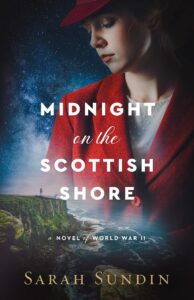by Sarah Sundin @sarahsundin
As readers, we delight in socializing with fellow book-lovers. As writers, we delight in connecting with readers. The continuing popularity of book clubs provides an opportunity for authors. By crafting engaging questions about your novel, you can help book clubs have amazing discussions that build community and love of story.
Since I belonged to a book club before I was published, I knew the importance of good discussion questions. While some groups fall naturally into discussion, some don’t, and good questions stimulate conversation.
Often writers are stumped when it’s time to write questions for their books. Here are some tips I’ve learned as both a book club member and an author.
1) PLEASE avoid spoilers, like “How did you feel when Reginald died?” Agh! He died? Readers are known to skim the questions before they read the book, and you don’t want to ruin their experience. To avoid spoilers, frame questions along the lines of “How does the ordeal in the second half of the book change [heroine/hero]?” or “What do you think of [hero/heroine’s] decision in [Chapter 37/toward the end of the story]?”
2) Include generic story-related questions. Some groups meet in public places and don’t like to get personal. For Midnight on the Scottish Shore, I included questions like, “At the beginning of the story, Cilla chooses the only escape she can envision. What did you think of her decision?”
3) Include some personal questions. Many book clubs love these, and individual readers often like to go deeper. For example, “Do you tend to gloss over your flaws, like Cilla—or to dwell on them too much, like Lachlan?”
Novelists! Do you want to engage book clubs? Start with engaging discussion questions! Tips from @sarahsundin #bookclubs #writing #ACFW Share on X4) Use layered questions around one theme, starting at the story level and going deeper. This allows the group to choose their level of discussion. For example, “Lachlan’s history of being betrayed has made him untrusting and guarded—and stingy with mercy. What causes him to change? Do you ever have trouble trusting or showing mercy? How can you overcome this?”
5) Consider lighter-weight questions to serve as icebreakers—questions that don’t require much thought but spark conversation. For my novel Embers in the London Sky, I had a question about pets, based on the hero’s cat, Lennox: “How does Lennox add to Hugh’s life? Have you ever had pets? How have they added joy, amusement, or chaos to your life?” And for Midnight on the Scottish Shore, I focused on hobbies: “Cilla has never seen herself as artistic, but boredom inspires creativity. Have you found this in your own life? What hobbies bring you joy?”
6) Look at various aspects of your story—action, history, romance, family, friendships, side characters, spiritual theme, internal struggles, and backstory issues. These are rich resources for discussion. If you have critique partners or beta readers, think about the questions they’ve raised, especially the “Why did she do that?” questions. These are the issues your readers will be eager to discuss.
7) If you’re writing a series, don’t be afraid to use a teaser. For example, in The Sky Above Us, the second book in my Sunrise at Normandy series, I asked, “If you read The Sea Before Us [Book 1], what did you think about the continuation of Wyatt Paxton’s story? From what you’ve heard about Clay Paxton, what might you expect in The Land Beneath Us [Book 3]?” This (I hope) drives interest in the series as a whole, as well as prompting discussion.
8) Use 12-20 questions so the club has a variety to choose from.
With insight and creativity, you can craft questions book clubs will adore!
 Sarah Sundin is an ECPA-bestselling author of World War II novels, including “Midnight on the Scottish Shore.” Her novels have received the Christy Award and the Carol Award. Sarah lives in Southern California and serves as co-director of the West Coast Christian Writers Conference. Visit her at www.sarahsundin.com.
Sarah Sundin is an ECPA-bestselling author of World War II novels, including “Midnight on the Scottish Shore.” Her novels have received the Christy Award and the Carol Award. Sarah lives in Southern California and serves as co-director of the West Coast Christian Writers Conference. Visit her at www.sarahsundin.com.

Comments 6
Excellent tips, Sarah. Thank you so much!
SUPER helpful! Thank you so much.
Thank you! This was very helpful. I’m getting ready to write questions for my book releasing in March.
Thank you, thank you, thank you. I understand a book tour may be in my future and I wondered about the best ways to get the discussion going. Your advice is priceless. Thanks!
Thank you for sharing. Do you print the questions in the book? If so, at the beginning of the book, at the end of the book, or the questions at the end of each chapter that the questions pertain to?
There are some really great examples here. Thank you for posting this.